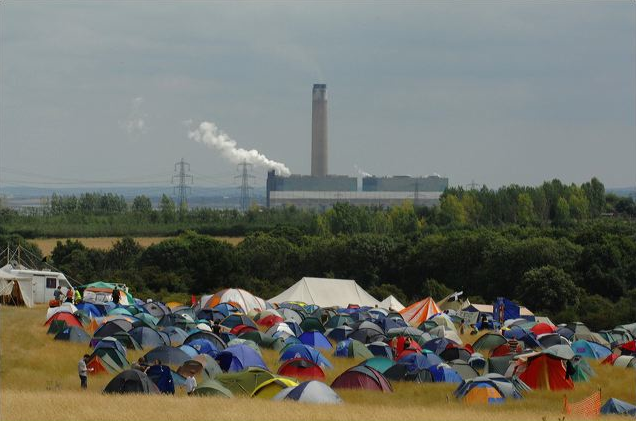Climate Camps 2008
Photo: Guy Smallman
This summer (2008) Camps for Climate Action have been held in several countries. While we didn’t make it to some of them, such as the quite significant Australian event, the latest issue of Turbulence was distributed in some numbers at both the British and German camps, while members of the Turbulence collective also participated in the talks and workshops that were held there.
As part of this intervention we have both gathered together some record of our contributions as well as some analysis of the events that we have come across. We have done the same with other events we have intervened in such as the anti-G8 protests in Heilegendamn. The aim of this is to aid the analytic process by acting as a catalytic space to carefully consider our interventions and actions. This, we think, should be facing both inwards, towards our movements, and outwards towards the world and how our movements are theorised and represented, and the impacts they can be seen as having.
This process has brought to the fore a couple of potential problems or tensions that it seems helpful to discuss. In fact both problems, in their different ways, stem from concerns about the ways that the high profile of some individuals or groups can distort or interrupt the process of movements analysing and transforming themselves.
When we began to gather analysis of the climate camps (primarily the UK camp) we found a trend towards poles of attention gathering around two relatively well-known individuals. The first was the president of the National Union of Miners (and class-struggle icon) Arthur Scargill, who visited the camp to defend the coal industry. His visit was prompted by the critical attitude taken towards the camp by anarchist and ex-miner Dave Douglass, who, while he attended the camp and ran workshops, at one point even went so far as to suggest a counter demonstration against the camp and in support of the coal industry. This approach has provoked some debate around climate activism and class. However, in the mainstream media this was reduced to a debate on the various merits of Coal versus Nuclear power, between Arthur Scargill and the second ‘well-known figure’, political commentator George Monbiot. Indeed, the second pole of attention has been around Monbiot, who was at the UK camp advocating a strong state to tackle climate change. This sparked much debate within the camp on the role(s) ‘the state’ might play around the issue of climate change.
Discussions around both class and state have become linked with these well-known figures. These dynamics of how a movement is represented both to its outside and to itself, can distort the analytical process, moving the centre of discussion away from how it was experienced at the camp. This distorting dynamic arises from the increased attention given to those who are able and confident enough to speak at large meetings or have better access to the mainstream media because, for instance, their views fit better with the dominant narrative of the world. The dilemma here is that by collecting this analysis together we are completing a positive feedback loop and solidifying these distorting effects.
Nevertheless, we can’t deal with those dynamics by just ignoring them. As a starting point, our analysis must begin from where we are, not from where we wish to be. We can however try to be aware of such dynamics, bring them into our understanding of our movements, and experiment with tools and techniques to undermine them.
One dynamic we have seen play out before is the tendency towards the polarisation of debates which often occurs when they take place through mediatised polemics, with poles becoming associated with particular individuals. When this happens there can be a tendency to identify with one individual or another causing a slide into factionalism. In fact at the core of most of these debates are genuine, concrete dilemmas that can run straight through the middle of the people involved. Accompanying this personalisation of politics, is the danger of the erection of experts, where the much more general process of analysis and transformation that took place at the camps becomes reduced to the personality characteristics of particular individuals.
Of course we’re aware that our own activities could be the spark to this dynamic. Turbulence had a relatively high profile at the UK camp; one of our number even took part in a plenary debate with, amongst others, George Monbiot. We think, however, that this debate had a different tone to some of the other polemics, partly because, true to our latest issue, we have tried to avoid abstract polemics based on futurology. We’d rather focus on the concrete and specific situations that we find ourselves in. What needs to be analysed is whether the different currents of thought can work together in the near-future, and if not, can we at least manage their relationship? Planning further ahead becomes less and less useful the further you go. After all we know that ideas and subjectivities change in movement and that events can occur that change the whole basis on which we discuss and struggle.
Here is our round-up of useful and maybe-less-useful analysis from the climate camp. Check back again soon, as we’re hoping to update this page regularly.
Climate Change, The State and Class
‘The Road to 90% Cuts in CO2 Emissions and the Role of the State’ – Plenary debate at the Climate Camp With George Monbiot, Almuth Ernsting, Keir Milburn and Janusz from Copenhagen – mp3 50M.webloc
There was some debate on a similar topic at the Guardian website:
Ewa Jasiewicz: Time for a revolution
George Mobiot: Climate change is not anarchy’s football
Ewa Jasiewicz: Sunday in the camp with George
This sparked some debate on the Autopsy email list, including a reply from Mombiot. The discussioin starts here.
Another pole of debate was the attitude of some connected to the NUM
Dave Douglass reports on the camp to the NUM website.
Rachel analyses his position here.
The debate is also continued online here.
Other Analysis
Different members of the Free Association reflect here and here. The slides used in their presentation during the workshop, Who Can Save Us From the Future? Capitalist, Crisis, Austerity and Freedom, are available here.
Juliette Beck: Social change not climate change
Red Pepper: Climate Camp Blog
Last Hours magazine: Modern ecologism and its prospects
Adam Ford: Climate camp and class
Jack Ray: What was the point?
Uri Gordon and Lucy Michaels: Lessons from Climate Camp
Documentation
Photos galleries from the Camp are available via the Camp for Climate Action website here and the Guardian newspaper here.
And finally, the following amusing video about police confiscations at the climate camp has been put together by Undercurrents.
Please let us know of any other analysis or reflections on the camp: editors@turbulence.org.uk
The best place for analysis might be the post climate camp gathering 26th-28th Spetember in Manchester. For details, click here.



